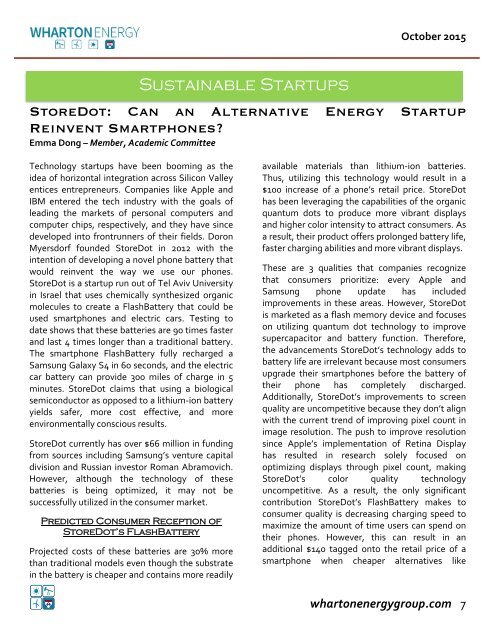You also want an ePaper? Increase the reach of your titles
YUMPU automatically turns print PDFs into web optimized ePapers that Google loves.
<strong>October</strong> <strong>2015</strong><br />
Sustainable Startups<br />
StoreDot: Can an Alternative Energy Startup<br />
Reinvent Smartphones?<br />
Emma Dong – Member, Academic Committee<br />
Technology startups have been booming as the<br />
idea of horizontal integration across Silicon Valley<br />
entices entrepreneurs. Companies like Apple and<br />
IBM entered the tech industry with the goals of<br />
leading the markets of personal computers and<br />
computer chips, respectively, and they have since<br />
developed into frontrunners of their fields. Doron<br />
Myersdorf founded StoreDot in 2012 with the<br />
intention of developing a novel phone battery that<br />
would reinvent the way we use our phones.<br />
StoreDot is a startup run out of Tel Aviv University<br />
in Israel that uses chemically synthesized organic<br />
molecules to create a FlashBattery that could be<br />
used smartphones and electric cars. Testing to<br />
date shows that these batteries are 90 times faster<br />
and last 4 times longer than a traditional battery.<br />
The smartphone FlashBattery fully recharged a<br />
Samsung Galaxy S4 in 60 seconds, and the electric<br />
car battery can provide 300 miles of charge in 5<br />
minutes. StoreDot claims that using a biological<br />
semiconductor as opposed to a lithium-ion battery<br />
yields safer, more cost effective, and more<br />
environmentally conscious results.<br />
StoreDot currently has over $66 million in funding<br />
from sources including Samsung’s venture capital<br />
division and Russian investor Roman Abramovich.<br />
However, although the technology of these<br />
batteries is being optimized, it may not be<br />
successfully utilized in the consumer market.<br />
Predicted Consumer Reception of<br />
StoreDot’s FlashBattery<br />
Projected costs of these batteries are 30% more<br />
than traditional models even though the substrate<br />
in the battery is cheaper and contains more readily<br />
available materials than lithium-ion batteries.<br />
Thus, utilizing this technology would result in a<br />
$100 increase of a phone’s retail price. StoreDot<br />
has been leveraging the capabilities of the organic<br />
quantum dots to produce more vibrant displays<br />
and higher color intensity to attract consumers. As<br />
a result, their product offers prolonged battery life,<br />
faster charging abilities and more vibrant displays.<br />
These are 3 qualities that companies recognize<br />
that consumers prioritize: every Apple and<br />
Samsung phone update has included<br />
improvements in these areas. However, StoreDot<br />
is marketed as a flash memory device and focuses<br />
on utilizing quantum dot technology to improve<br />
supercapacitor and battery function. Therefore,<br />
the advancements StoreDot’s technology adds to<br />
battery life are irrelevant because most consumers<br />
upgrade their smartphones before the battery of<br />
their phone has completely discharged.<br />
Additionally, StoreDot’s improvements to screen<br />
quality are uncompetitive because they don’t align<br />
with the current trend of improving pixel count in<br />
image resolution. The push to improve resolution<br />
since Apple’s implementation of Retina Display<br />
has resulted in research solely focused on<br />
optimizing displays through pixel count, making<br />
StoreDot’s color quality technology<br />
uncompetitive. As a result, the only significant<br />
contribution StoreDot’s FlashBattery makes to<br />
consumer quality is decreasing charging speed to<br />
maximize the amount of time users can spend on<br />
their phones. However, this can result in an<br />
additional $140 tagged onto the retail price of a<br />
smartphone when cheaper alternatives like<br />
whartonenergygroup.com 7









